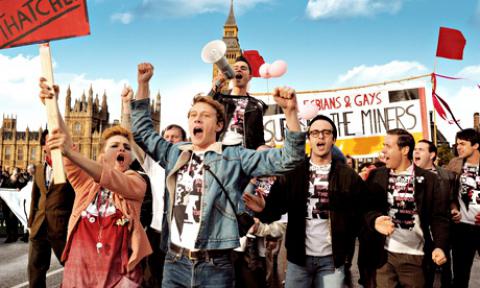He is one of the central characters in Pride, the feelgood film now in cinemas that tells how gay and lesbian activists threw their support behind a Welsh mining community during the strike of 1984.
But while many of those who inspired the film attended its recent premiere, Mark Ashton was absent. He died in 1987 of an Aids-related illness at the age of just 26. But now the film has sparked a surge of interest in his political activism. A memorial fund in his memory has received donations of more than £10,000 since the film's release this month.
"He was an everything person," said his friend Chris Birch. "He was an Irishman, a communist, an agitator, a lapsed Catholic who still went to mass very occasionally. He was very charismatic. His communism governed everything he did. He spent a couple of months in Bangladesh in '82 and the poverty really politicised him. I miss him terribly. People tell me I didn't smile for three months after he died."
Pride, which features a cast including Bill Nighy, Imelda Staunton and Paddy Considine, tells how Ashton co-founded Lesbians and Gays Support the Miners (LGSM), a movement that raised tens of thousands of pounds for striking miners, the two sides finding solidarity in their enmity towards Thatcherism and shared feelings of alienation.
Their collective sense of marginalisation was captured in a notorious Sun headline that branded the two groups "Pits and Perverts", an epithet that the paper's targets gleefully appropriated for a memorable fundraising concert at Camden's Electric Ballroom.
Pride shows how disparate groups of gay and lesbian people were inspired by Ashton, a gay man from Portrush in County Antrim, who was an active member of the Young Communist League, a fact overlooked in the film, apparently so as not to alienate American audiences.
With a soundtrack that features the Smiths and Billy Bragg, the uplifting film is in the mould of Billy Elliot, Brassed Off and The Full Monty. But it is only when the credits roll that viewers learn the fate of Ashton, to whom the Communards' Jimmy Somerville paid tribute in his song, For a Friend. "I´ll never let you down, a battle I have found," Somerville sings. "And all the dreams we had, I will carry on."
Roy James, a member of LGSM and a friend of Ashton, blames his early death on the lack of resources that went into combating HIV in the 80s.
"Aids was a key political issue, alongside Greenham Common, the women's movement, CND and Cruise missiles," James said.
"People were sick and dying and nothing was being done about it. In the film we're depicted as good, fluffy people supporting the miners but there was a clear strategy on Mark's part to align himself with the labour movement in order to get gay politics, sexual liberation, HIV and Aids treatment on to the political agenda."
At the time, prejudice was rife. The treatment of the gay community by the police was a major grievance. "HIV was seen as so scary back then," said Lisa Power, a volunteer at Switchboard, the telephone advice line for gay and lesbian people in London, where Ashton helped out. "Once we had to get some BT engineers to come and sort out our phones and they refused to come into the building."
Power remembers Ashton as a "firecracker of a human being". "He was completely irrepressible, incredibly committed and extremely uncompromising. He was one of the most vibrant, alive people that I knew."
Given such a climate, the miners and the gay community had a common enemy in the government of the time, Ashton believed, in that both groups were stigmatised. "The big issue was that Thatcher and Reagan were seen to be in cahoots," James said. "They were resisting any requests or demands that would start research funding. They did not do it until the heterosexual community demanded it. We, as gay people, saw it as a form of genocide."
Money raised for the miners was seen as a declaration against Thatcherism but it was also a corrective to the power base of the president of the National Union of Miners, Arthur Scargill, who had determined that any funds raised in the US and London in support of strikers should go to his favoured pits in Yorkshire and Kent, leaving south Wales to fend for itself.
Finding groups sympathetic to their plight was therefore crucial to the mining communities not favoured by Scargill.
"We sought to broaden the struggle beyond the picket lines to what we called an anti-Thatcher broad democratic alliance," recalled Hywel Francis, MP for Aberavon, and a former member of the Communist party, who helped forge links between the gay community and Welsh miners. "That is why our support group also set up the South Wales Striking Miners' Choir and the South Wales Striking Miners' Rugby Team."
By January 1985 there were 11 LGSM groups around the country. Ashton died just two years later but he lived long enough to see his dream that gay rights should become part of the political agenda realised. The 1985 Labour party conference saw a motion to support equal rights for gay men and lesbians go down to the wire. It was carried only due to the block votes of the National Union of Mineworkers and its allies.
"This was a major turning point for the fortunes of lesbians and gay men as it allowed the more progressive elements of the Labour party to push for a real implementation of this policy," argued Colin Clews, a member of LGSM and an HIV rights campaigner, in his blog.


Spread the word